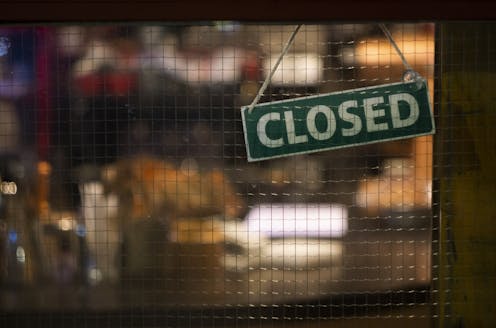Failed NZ businesses leave a trail of destruction. Here are 3 things Inland Revenue could do to minimise damage
- Written by Lisa Marriott, Professor of Taxation, Te Herenga Waka — Victoria University of Wellington

It feels like there is a high-profile liquidation every other week. Media coverage has included stories on the collapse of tiny home[1] companies[2], construction firms[3] and homeware retailers[4], among many others. In just the past week, a failed pool company[5] was under the spotlight.
When businesses enter liquidation they usually leave a trail of destruction – unpaid suppliers and employees as well as customers who do not receive what they have paid for.
There are things we can do as individuals to minimise the risk associated with choosing a business to work with. For instance, you can obtain a business credit report[6] which offers a snapshot of a company’s creditworthiness. But this comes with an added cost of at least NZ$49.
But my research shows Inland Revenue is doing less to share information about failing businesses than other comparable government agencies overseas. This needs to change to give New Zealanders greater transparency about businesses on the brink.
Early warning signs to watch for
Inland Revenue initiates more than 60% of liquidations in most years in Aotearoa. But this move often comes after a long period of non-payment.
Early recognition of uncollected tax debt can signal to potential customers or business partners that a company has problems.
The taxes that are likely to point to larger business issues are non-payment of goods and services tax (GST) and employment related withholding taxes, such as KiwiSaver contributions and pay-as-you-earn (PAYE).
Read more: What struggling businesses can do to weather the economic storm[7]
These taxes are withheld on behalf of the state. There are relatively short periods between when these funds are collected and when they should be paid to Inland Revenue. Therefore, non-payment provides an early signal of trouble.
Over half of the Inland Revenue tax debt as of 2021 was made up of GST and employment related taxes, totalling $2.4 billion. And it is well established that the longer debts are unpaid the less likely they are to be collected.
My research – soon to be published in the Australian Tax Review – suggests that the non-payment of certain taxes can function as an early warning sign and minimise the knock-on impact on customers and other businesses when a company is no longer viable.
What Inland Revenue can learn from overseas
Other countries approach failing businesses more proactively than we do in New Zealand. Here are three ways New Zealand can improve how it deals with companies heavily in debt.
1. Publish details of tax defaulters
Many European countries do this. For example, the Irish Tax and Customs publishes a quarterly list of tax defaulters. This includes their name, address, occupation, unpaid tax, interest, penalties and the type of tax.
There are some criteria for publication, such as that debts must exceed €50,000 (around NZ$90,000). But a press release is written and sent out with each list.
2. Tell credit ratings agencies about business tax debts
In Australia, this can happen when the tax debt is above A$100,000, is more than 90 days overdue, and the taxpayer is not engaging with the tax authority on repayment. This visibility is intended to inform others who are in business with, or looking to do business with, the defaulting company.
Read more: NZ's plan for deposit insurance falls well short of protecting people's savings[8]
3. Make business directors personally accountable
Again in Australia, company directors can be personally responsible for certain business tax liabilities – specifically pay-as-you-go (PAYG) withholding, GST and the superannuation (Australia’s main type of retirement fund) guarantee charge.
When this happens, the Australian Tax Office issues a “director penalty notice”. After this is issued, it can only be remitted by full payment of the debt within 21 days, appointing an administrator, appointing a small business restructuring practitioner, or commencing winding up proceedings. If one of these actions isn’t taken within 21 days, the director becomes personally liable for the debt.
There is an argument that directors need protection from personal liability for tax debt incurred by their company, to ensure they are willing to engage in some level of risk taking.
However, the Australian director penalty regime is intended to minimise any incentive to engage in excessive risk taking, such as trading while insolvent.
Quick and direct action
Quicker – and more transparent – action by Inland Revenue is likely to better contain the contagion of a failed or failing business. This would ensure that current and potential suppliers, current and potential employees, and other stakeholders are aware of the business’ financial situation.
Read more: The ugly story of Dick Smith, from float to failure[9]
While being more proactive in responding to failing businesses, Inland Revenue needs to support taxpayers to meet their tax obligations. There is nothing to be gained from forcing viable entities into liquidation when they have a short-term trading or cash flow problem.
But allowing unviable businesses to continue to operate with unpaid withheld tax obligations for long periods is likely to increase the negative impact on the wider community. In many cases, Inland Revenue has the potential to reduce this impact.
References
- ^ tiny home (www.stuff.co.nz)
- ^ companies (www.nzherald.co.nz)
- ^ construction firms (www.nzherald.co.nz)
- ^ homeware retailers (www.stuff.co.nz)
- ^ pool company (www.stuff.co.nz)
- ^ business credit report (www.centrix.co.nz)
- ^ What struggling businesses can do to weather the economic storm (theconversation.com)
- ^ NZ's plan for deposit insurance falls well short of protecting people's savings (theconversation.com)
- ^ The ugly story of Dick Smith, from float to failure (theconversation.com)
Authors: Lisa Marriott, Professor of Taxation, Te Herenga Waka — Victoria University of Wellington














